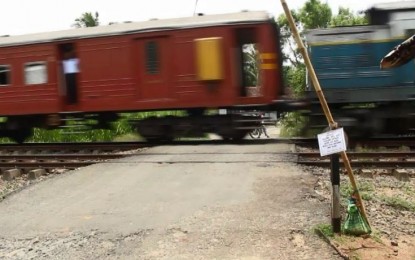Unprotected Railway Crossings: The Plight
July 13, 2016 01:31 pm
By Shamila Naleer
Thorough investigations done by Ada Derana on the matter of exposed railway crossings have raised questions that require a prompt response.
Sri Lanka has indeed suffered from the precarious situation of unmanned railway crossings. Innocent lives have been claimed and the crippled and injured will remain forever traumatized. Nevertheless, one must wonder how the issue is being controlled.

(A protest staged by a group of gatekeepers in Vavuniya on July 12)
Sri Lanka’s statistical and existing status

The total length of Sri Lanka’s railway lines sums up to an approximate 1500km, as stated by the Ministry of Transport. Along this long stretch of train tracks, 1047 stand protected by some sort of barrier; 132 crossings are protected by electrical barriers and 140 by mechanized barriers. A hefty number of 758 are manned by wing type gates and a lesser number of 17 hold farm type gates. Amongst this, we also have a 166 bell and flashing light systems.
On the other hand, we have around 620 unprotected barriers in our country, which means a rounded figure of 37% of railway crossing barriers is unprotected.
Within the year of 2016 itself, the months of March till July stood witness to strikes launched by the Unprotected Railway Crossing Gate Operators, calling away an approximate number of 2000 gatekeepers and crossings already lacking adequate protection were further left unmanned, leaving pedestrians and vehicles to possibly fall prey to train accidents.
Why aren’t these risky intersections being protected?
Along the country’s coastline, numerous establishments are emerging, ranging from small homes to boutique hotels. Many of these tend to be ‘squatters’- people or parties that do not own, rent or have lawful permission to use a particular place or area. As a result, smaller roads are formed and unofficial railway crossings are created. Providing protection for such intersections can prove to be difficult.
It should also be realized that not every single crossing can be barrier protected because it requires regular attention and maintenance as well as funding and other resources. In a country drowning in financial crises and other economic issues, allocating resources to place gates at every single crossing would be a problem.
Where does this predicament stand worldwide?

The presence of unmanned railway crossings is not uncommon in every country. The International Rail Safety Conference observed that countries in Asia had two extremes; countries that largely invested in taking steps towards reducing the number of unprotected crossings and countries that did little to tend to these issues.
40% of India’s crossings are protected, while 51% were open crossings with warning signs and 7% stood neither barrier protected and lacked the presence of road warning signs. India, nonetheless, lacked sufficient resources to implement a proper system to drastically reduce the number of accidents.
On the other hand, we have Japan, who went to the extent of dividing level crossings into four classes; barrier protected crossings with warning lights, temporarily manned crossings with barrier protection, no barrier protection, but with flashing lights, audible warning devices and fixed road signs, and crossings with only fixed warning signs.
India planned to respond by attempting to protect their unmanned crossings and to expand the involvement of Indian Railway Management in road user education. Meanwhile, Japan saw a decline in the number of railway accidents as the policies they established were effective. They planned to install high-tech optical crossing obstruction detectors that would ultimately allow train drivers to apply emergency braking and stop trains short of the crossing, should an obstruction be present.

Administering this issue
The UNESCAP (United Nations Economic and Social Commission for Asia and the Pacific) brought forward certain recommendations to improve level crossing safety, such as re-evaluating the country’s approach to monitoring crossing safety and prioritizing the implementation of safety enhancement measures. Unofficial level crossings must either be closed or provided with effective protection and campaigns should be carefully developed and directed at the education of level crossing users and ensure adequate funding is available and provided for these campaigns.
It is also regular for impatient vehicles, especially motorbikes and three-wheelers, to disregard the often short barrier at level crossings. What purpose does this gate serve, if not to hinder vehicles from passing when a train is nearing? To address this, it would be best if gates are lengthened in order to block the entire road, and not a mere half.
Moreover, we face a “Boy who cried wolf” situation sometimes when it comes to the bell and light warning system ; that is, they tend to give out warnings even when trains are nowhere near or several minutes after they have gone. Ergo, people tend to ignore the warnings.
The Government should also decide how to respond to the protests of the gatekeepers or face more industrial action in the days to come. If gatekeepers are not present at where their duty calls them, people using these risky intersections will fall into further danger.












